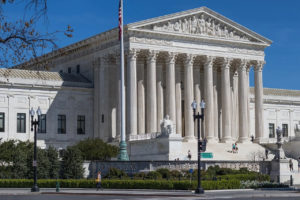 The U.S. Supreme Court today overturned a 2020 appellate court ruling that struck down three improper small refinery exemptions granted by previous EPA administrators, disappointing the coalition of renewable fuel and farm groups that brought the case. However, the industry remains hopeful that other elements of the original ruling that were unchallenged will discourage future abuses of the exemption program.
The U.S. Supreme Court today overturned a 2020 appellate court ruling that struck down three improper small refinery exemptions granted by previous EPA administrators, disappointing the coalition of renewable fuel and farm groups that brought the case. However, the industry remains hopeful that other elements of the original ruling that were unchallenged will discourage future abuses of the exemption program.
The decision stems from a May 2018 challenge brought against EPA in the U.S. Court of Appeals for the Tenth Circuit by the Renewable Fuels Association, the National Corn Growers Association, National Farmers Union, and the American Coalition for Ethanol. Working together as the Biofuels Coalition, the petitioners argued that the small refinery exemptions were granted in direct contradiction to the statutory text and purpose of the RFS.
In January 2020, the Tenth Circuit decided that EPA cannot “extend” exemptions to any small refineries whose earlier, temporary exemptions had lapsed. Regarding the intended definition of “extension,” the Supreme Court agreed with the refineries that it does not require “continuity.”
Still, the coalition is “optimistic that other elements of the Tenth Circuit decision, which were not reviewed by the Supreme Court, will compel the Biden administration and EPA’s new leadership to take a far more judicious and responsible approach to the refinery exemption program than their predecessors did.”
Irrespective of today’s decision, the Biofuels Coalition thanked President Biden and EPA Administrator Regan for taking swift action to rein in the previous administration’s mismanagement of the small refinery exemption program. After carefully reviewing the issue, new EPA leadership in February reversed the agency’s previous position and announced support for the Tenth Circuit decision. In April, EPA decided to revoke three last-minute refinery exemptions granted the day before President Biden’s inauguration; and in May, EPA announced it would cooperate with a Government Accountability Office investigation into the past administration’s adjudication of small refinery exemptions.
As of today, 70 small refinery exemption petitions remain pending with EPA, for the compliance years 2011-2020.
Post Update:
The four members of the coalition involved in the court case—the Renewable Fuels Association, National Corn Growers Association, American Coalition for Ethanol, and National Farmers Union—held a conference call for news media to discuss the justices’ opinion and the ramifications for the Renewable Fuel Standard, the U.S. ethanol industry and American agriculture. You can listen to the call below which starts with prepared remarks and then Q&A with media.
PRESENTERS
- Geoff Cooper, President and CEO, Renewable Fuels Association
- John Linder, President, National Corn Growers Association
- Brian Jennings, CEO, American Coalition for Ethanol
- Rob Larew, President, National Farmers Union
- Matthew W. Morrison, Partner, Pillsbury Winthrop Shaw Pittman LLP
You can listen to the call and download it here: Biofuels Coalition Conference Call (42:46)
 With interest in low carbon fuels growing, the National Biodiesel Board (NBB) is experiencing growth in membership within the biodiesel and renewable diesel industry. Eight new companies have joined the organization in the last year, according to CEO Donnell Rehagen.
With interest in low carbon fuels growing, the National Biodiesel Board (NBB) is experiencing growth in membership within the biodiesel and renewable diesel industry. Eight new companies have joined the organization in the last year, according to CEO Donnell Rehagen.






 It’s summertime and Americans are celebrating by hitting the road again after being mostly stuck at home last year.
It’s summertime and Americans are celebrating by hitting the road again after being mostly stuck at home last year. 

